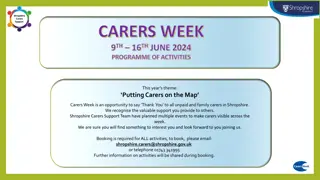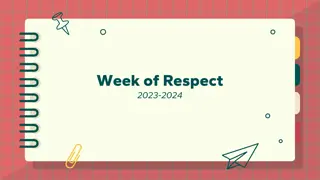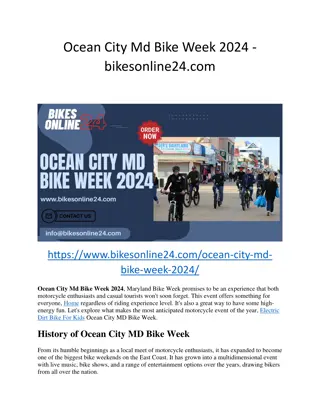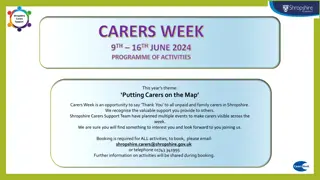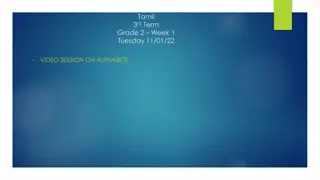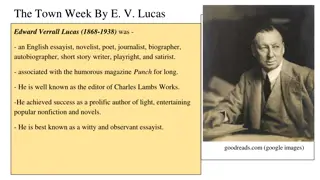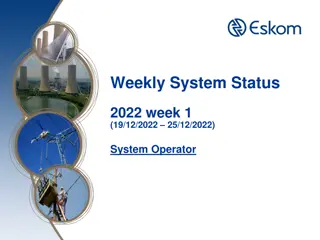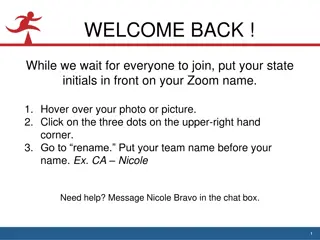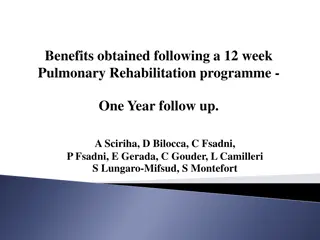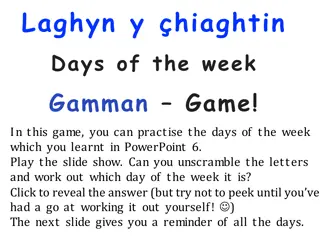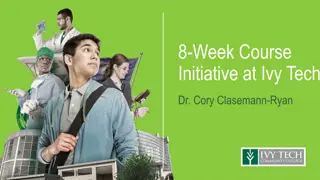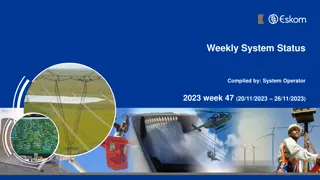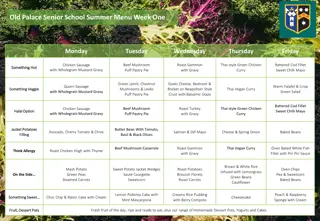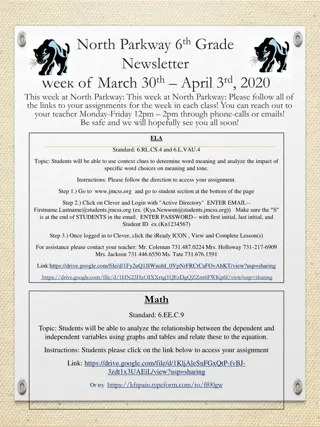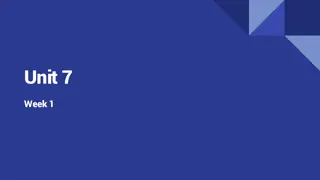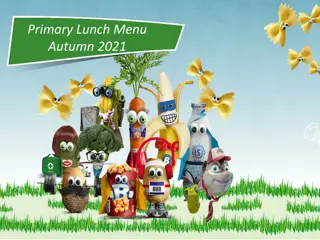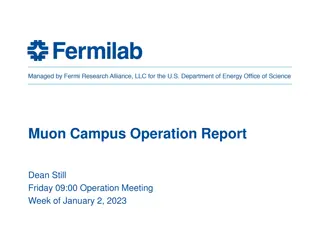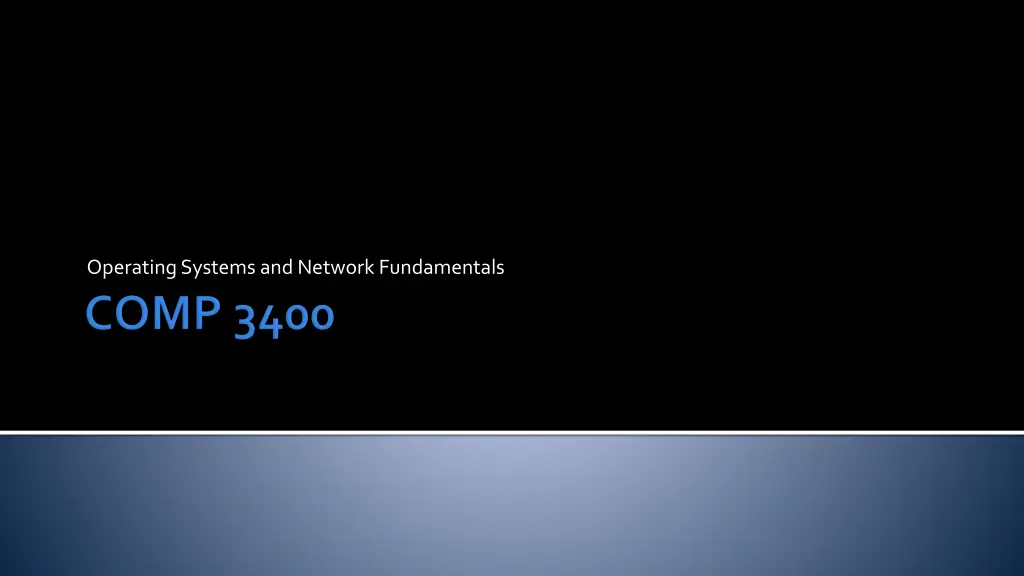
Computer Systems Fundamentals: Dive Deeper into Operating Systems and Network Basics
Explore the world of computer systems fundamentals with Dr. Barry Wittman. Gain expert knowledge in C programming, Linux system calls, processes, signals, and more. Get ready to enhance your skills in network programming and synchronization. Stay updated with course information on the faculty webpage. Prepare to delve into the depths of computer science!
Download Presentation

Please find below an Image/Link to download the presentation.
The content on the website is provided AS IS for your information and personal use only. It may not be sold, licensed, or shared on other websites without obtaining consent from the author. If you encounter any issues during the download, it is possible that the publisher has removed the file from their server.
You are allowed to download the files provided on this website for personal or commercial use, subject to the condition that they are used lawfully. All files are the property of their respective owners.
The content on the website is provided AS IS for your information and personal use only. It may not be sold, licensed, or shared on other websites without obtaining consent from the author.
E N D
Presentation Transcript
Dr. Barry Wittman Not Dr. Barry Whitman Education: PhD and MS in Computer Science, Purdue University BS in Computer Science, Morehouse College Hobbies: Reading, writing Enjoying ethnic cuisine DJing Lockpicking Stand-up comedy
wittman1@otterbein.edu Art & Communication C123 (614) 823-2944 E-mail: Office: Phone: Office hours: MWF10:15 11:15 a.m., MW 3:00 4:00 p.m., F T TR and by appointment Website: http://faculty.otterbein.edu/wittman1/ 3:00 5:00 p.m., 10:00 11:15 a.m., 2:00 4:00 p.m.,
Majors Computer Science 100%
What's the purpose of this class? What do you want to get out of it? Do you want to be here?
Michael S. Kirkpatrick OpenCSF: Computer Systems Fundamentals Available: https://w3.cs.jmu.edu/kirkpams/OpenCSF/Books/csf/html/ The book is free and includes interactive questions to test your knowledge at the ends of sections
You are expected to read the material before class If you're not prepared, you might be asked to leave You might forfeit the education you have paid around $100 per class meetingto get!
Deeper C expertise Linux system calls Processes Signals Interprocesscommunication Shared memory Threading Synchronization Network programming
For more information, visit the webpage: http://faculty.otterbein.edu/wittman1/comp3400 The webpage will contain: The most current schedule Notes available for download Reminders about exams and homework Syllabus (you can request a printed copy if you like) Detailed policies and guidelines
27% of your grade will be three equally weighted projects Each will focus on a different topic: Function pointers and finite state machines Processes and intrusion detection Networking and CGI You will work on each project in two-person teams
All projects are done in teams of two You may pick your partners But you have to have a different partner for each project! Use Brightspace to form teams Projects must be uploaded to Brightspace
Projects must be uploaded to Brightspace beforethe deadline Late projects will not be accepted Exception: Each person will have 3 grace days You can use these grace days together or separately as extensions for your projects You must inform me before the deadline that you are going to use grace days If two people in a team don't have the same number of grace days, the number of days they will have available will be the maximum of those remaining for either teammate
Projects (and assignments) work differently than in my other classes Relatively large frameworks of skeleton code will be given to you Unit tests and integration tests will also be provided Understanding the tests will help you understand what you need to code You won't have to write much code but it will have to be code that you understand well
Inside the top-level project directory, type make test to run the tests The top-level directory will contain a tests directory with lots of important stuff: tests/public.c Driver for unit tests, using the Check framework for unit testing Some tests will be given, but you should add more tests/itests.include Configuration file that gives command-line arguments for integration testing. You can modify this file to add test cases for both good and bad command-line arguments. tests/expected/ Directory contains text files with the expected output for integration tests. When you add test cases to itests.include, you must also create a corresponding .txt file in this directory diff is used to check, so output must match to the character tests/inputs/ Directory contains files that can be used as input to the projects tests/Makefile, tests/integration.sh, and tests/testsuite.c Drivers for the testing infrastructure that you don't need to modify
24% of your grade will be single-week programming assignments These assignments are grouped: Assignments 1 and 2 are grouped with Project 1 Assignments 3 and 4 are grouped with Project 2 Assignments 5 and 6 are grouped with Project 3 Assignments 7 and 8 are grouped together without a project Because the code is interrelated, you will have the same teams for each grouping of assignments and projects Assignments are intended to make the projects easier Do the grouped assignments first before starting on the project!
Assignments must be uploaded to Brightspace beforethe deadline Late assignments will not be accepted There are no grace days for assignments
5% of your grade will be tickets out the door These tickets will be based on material covered in the previous one or two lectures They will be graded leniently They are useful for these reasons: 1. Informing me of your understanding 2. Feedback to you about your understanding 3. Easy points for you 4. Attendance
There will be two equally weighted in-class exams totaling 30% of your final grade Exam 1: 02/17/2025 Exam 2: 03/24/2025 The final exam will be worth another 14% of your grade Final: 8:00 10:00 a.m. 4/30/2025
OpenCSF Chapters 1 Week Starting Topics Notes 1 01/13/25 Introduction 2 01/20/25 Kernel and System Calls 2 Assignment 1 3 01/27/25 Processes, files, and signals 2 Assignment 2 4 02/03/25 IPC 3 Project 1 5 02/10/25 Shared Memory 3 Assignment 3 6 02/17/25 Networking 4 Assignment 4 7 02/24/25 More Networking 4 8 03/03/25 Internet 5 Project 2 03/10/25 Spring Break 9 03/17/25 Threading 6 Assignment 5 10 Synchronization Primitives 03/24/25 7 Assignment 6 03/31/25 More on Synchronization Primitives 11 7 12 04/07/25 Synchronization Problems 8 Project 3 13 04/14/25 Parallel and Distributed Systems 9 Assignment 7 14 04/21/25 Review All Assignment 8
Project 1: 9% Tentatively due 02/07/2025 Project 2: 9% Tentatively due 03/07/2025 Project 3: 9% Tentatively due 04/11/2025
Assignment 1: 3% Tentatively due 01/24/2025 Assignment 2: 3% Tentatively due 01/31/2025 Assignment 3: 3% Tentatively due 02/14/2025 Assignment 4: 3% Tentatively due 02/21/2025 Assignment 5: 3% Tentatively due 03/21/2025 Assignment 6: 3% Tentatively due 03/28/2025 Assignment 7: 3% Tentatively due 04/17/2025 Assignment 8: 3% Tentatively due 04/25/2025
Three projects Equally weighted 27% Eight assignments Equally weighted 24% Tickets out the door 5% Two equally weighted midterm exams 30% Final exam 14%
A 93-100 B- 80-82 D+ 67-69 A- 90-92 C+ 77-79 D 60-66 B+ 87-89 C 73-76 F 60-62 B 83-86 C- 70-72
You are expected to attend all classes You are expected to have read the material we are going to cover beforeclass Missed tickets out the door cannot be made up Exams must be made up beforethe scheduled time, for excused absences
I hate having a slide like this I ask for respect for your classmates and for me You are smart enough to figure out what that means A few specific points: Silence communication devices Don't play with your phones Don't use the computers in class unless specifically told to No food or drink in the lab
We will be doing work on the computers together However, students are always tempted to surf the Internet, etc. Research shows that it is nearly impossible to do two things at the same time (e.g. watch TikTok and listen to a lecture) For your own good, I will enforce this by taking 1% of your final grade every time I catch you playing on your phones or using your computer for anything other than course exercises
Don't cheat First offense: I will try to give you a zero for the assignment, then lower your final letter grade for the course by one full grade Second offense: I will try to fail you for the course and try to kick you out of Otterbein Refer to the syllabus for the school's policy Ask me if you have questions or concerns You are not allowed to look at another student's code, except for group members in group projects (and after the project is turned in) I will use tools that automatically test code for similarity
Artificial Intelligence (AI) is any computer system designed to perform a cognitive or behavioral task historically believed to be one only humans can perform. Generative AI is a term used for recent AI systems that generate significant quantities of content such as text, images, audio, or video from a short input prompt, usually text. Although generative AI tools are impressive, they must not be used to write any code that a student is expected to turn in for this class. Generative AI tools may be used to explain existing code or to suggest improvements for code but only after the project or assignment in question has been turned in. Students who do not write code themselves have missed the opportunity to gain the skills of logical problem solving and translation to a formal programming language that are essential for computer scientists. Submitting work that includes or is derived from AI-generated materials shall be considered an act of academic dishonesty.
The University has a continuing commitment to providing access and reasonable accommodations for students with disabilities, including mental health diagnoses and chronic or temporary medical conditions. Students who may need accommodations or would like referrals to explore a potential diagnosis are urged to contact Disability Services (DS) as soon as possible. DS will facilitate accommodations and assist the instructor in minimizing barriers to provide an accessible educational experience. Please contact DS at DisabilityServices@otterbein.edu. More info can also be found here. Your instructor is happy to discuss accommodations privately with you as well.
In most classes, I let you make a lot of choices about style For example, should you have braces on the same line as the header or the next line? I emphasize consistency In this class, however, you have to use GNU style for C It's different from any style you've probably used before And ugly! But it has value for several reasons: 1. It's a real standard used for GNU projects, including a huge number of open- source projects 2. You might be forced by your employer to adhere to some arbitrary standard in the future 3. Being able to adopt a particular standard as needed is a good skill for a professional software engineer
There's a long-standing, quasi-religious debate over whether code should be indented with spaces or tabs https://www.youtube.com/watch?v=oRva7UxGQDw Because of the Java IDEs we use, you're probably used to tabs Bad news: GNU style uses exactly two spaces for all indentation Good news: Your development practices don't need to change much. Tab (\t) is a character, but it doesn't have to be the character that pops out when you press the tab key on your keyboard Most development environments allow you to specify that hitting the tab key can produce a tab or a specific number of spaces You can configure gedit (or whatever IDE you're using) to output 2 spaces whenever you hit tab
In GNU style, pairs of braces should be in the same column, one below the other, unlike the Java standard of putting opening braces on the same line as the header Blocks like functions, selection statements, and loops should be indented with 2 spaces If you're indenting a single line, that's all you need to do However, selection statements and loops have their braces indented and the contents of those braces indented again if (i < 10) { printf ("%d\n", i); } else { printf ("Too big\n"); }
Another peculiarity of GNU style is that the return types of functions are written on the line before the function name, making the function name the first thing on a line int main (int argc, char **argv) { /* Code here */ return 0; }
First, the test suite included with every project and assignment will check for compliance with GNU style and complain about every file that doesn't match Second, there's a magical tool called clang-format that can actually convert your code into GNU style (or a bunch of other styles) Example using clang-format to convert something called program.c to GNU style: > clang-format --style=gnu -i program.c
For a more explanation and examples of the style you're expected to use, please visit the COMP 3400 Standards page: http://faculty.otterbein.edu/wittman1/comp3400/standards/ On a related note, even the best CS programs don't always have time to help students learn all the tools they'll need to use: editors, scripting, version control, debugging, etc. At MIT, some people put together a series of video and text lectures explaining what they think are some of the most important tools: https://missing.csail.mit.edu/
The word "systems" comes up in computer science all the time It means nothing, and it means everything We can think of a computer system as a collection of interacting components Application Application Application Application Hardware: CPU Storage I/O RAM All attached via a PCB Software: OS talking to the hardware Applications OS PCB Display CPU RAM Storage
Just as one computer can be thought of as a system, we can also network computers together to form systems of systems There are problems communicating within a single computer These problems happen at a larger scale when communicating and coordinating between many computers Traditional OS course focus almost exclusively on process scheduling and memory management within a single computer This course focuses on the same fundamental problems but at several levels of implementation Its goal is to make you a better programmer rather than an expert on OS internals
Systems are complex Thus, we make models, simplified representations of systems These models are often visual, taking the form of labeled boxes with arrows But formal models like equations or statements of logic are common too If you've taken COMP 3100, you're familiar with UML, a standard visual way to model systems in CS The level of abstraction means how much detail has been removed A high level of abstraction means we're focusing on the essentials of the system As computer scientists, we often have to turn models into code
Course themes System architectures
Read sections 1.3 and 1.4 If you're rusty on C, read Appendix A Look over Assignment 1 Due next Friday Form teams for Assignments 1 and 2 and Project 1 Consider dual-booting Linux on your machine if you don't have it already Another option is running Linux inside of Virtual Box

